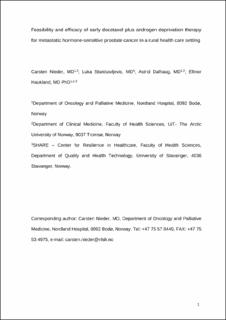Feasibility and efficacy of early docetaxel plus androgen deprivation therapy for metastatic hormone-sensitive prostate cancer in a rural health care setting
Peer reviewed, Journal article
Accepted version
Permanent lenke
https://hdl.handle.net/11250/3058722Utgivelsesdato
2022Metadata
Vis full innførselSamlinger
Originalversjon
Nieder, C., Stanisavljevic, L., Dalhaug, A., & Haukland, E. (2022). Feasibility and efficacy of early docetaxel plus androgen deprivation therapy for metastatic hormone-sensitive prostate cancer in a rural health care setting. Scandinavian Journal of Urology, 56(2), 114-118. 10.1080/21681805.2022.2028006Sammendrag
Aim/Background
The aim of this study was to evaluate the feasibility and efficacy, in terms of overall survival, of intensified upfront systemic therapy in patients with metastatic hormone-sensitive prostate cancer who lived in rural Nordland County, Norway.
Patients and methods
Overall 117 patients were included in this retrospective study. Three cohorts were created: early docetaxel and androgen deprivation therapy (ADT; the CHAARTED regimen; n = 37), ADT only during the same time period (2014–2020; n = 33), and ADT only in the years 2009–2014 (n = 47).
Results
Four patients (11%) did not complete 6 cycles of docetaxel, one of these due to early progression of cancer. During follow-up, 8 patients (22%) progressed to castration-resistant disease (mCRPC), compared to 24 (73%) with ADT only and 35 (75%) in the historical cohort, p = 0.000001. Such progression occurred within 12 months in 3 patients (8%) treated with docetaxel and 9 patients (27%) treated with ADT only during the same time period, p = 0.05. Median survival was 56 months (95% CI: 40–72 months), compared to 30 months in both other cohorts. 3-year survival rates were 79%, 38% and 37%, respectively (p = 0.016). In multivariate analysis, the CHAARTED regimen was associated with significantly improved survival.
Conclusion
In this rural health care setting, early docetaxel was feasible and effective in reducing progression to mCRPC and prolonging survival. Median survival was very close to the 58 months reported in the CHAARTED trial.
